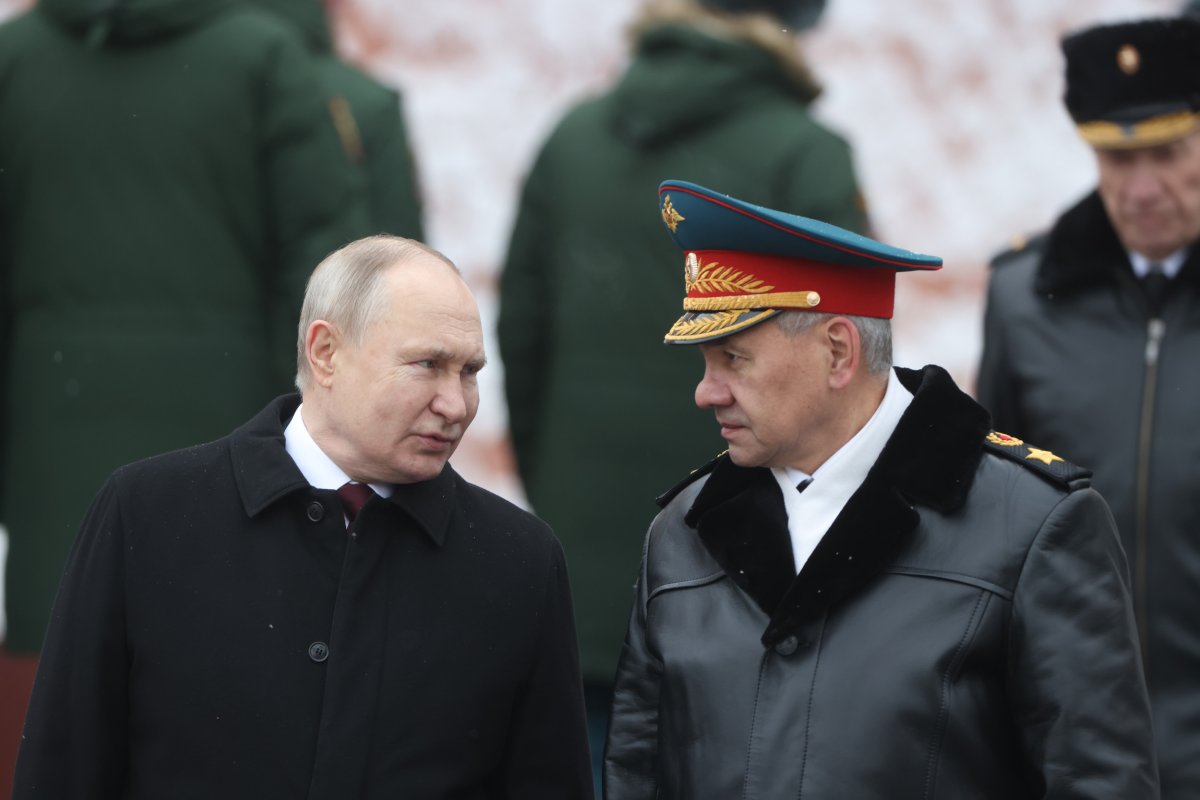Two new Russian armies announced by Moscow are likely to face training and equipment issues, according to U.K. intelligence sources.
London's Ministry of Defence (MoD) acknowledged that two new combined arms armies (CAA) and 14 divisions, as well as 16 brigades, could in theory be staffed by the end of 2024, as announced on March 20 by Russia's Defense Minister Sergei Shoigu.
But the MoD believes making these groups operational is problematic for a number of reasons, including lack of training and "legacy equipment."
Other sources believe that the mobilization involved in creating the fighting units will signify or force a change towards an acknowledgement by Russian President Vladimir Putin that his country is in a "state of war," rather than conducting a "special military operation in Ukraine."

Newsweek reached out to Russia's defense ministry via email for comment on Monday.
It's not clear how many troops will be needed to create the new units, but Putin has reportedly come under increasing pressure to take a more aggressive approach to his war against Ukraine and introduce a full-scale mobilization.
The Russian president has so far announced a "partial mobilization" of the population in the fall of 2022, and that targeted 300,000 reservists and ex-military personnel with "certain military specialties and relevant experience."
British military intelligence said that while the exact type, location, and composition of the new units was not stated, "a mix including mechanised, armored, artillery, and logistics is most likely."
"It is a realistic possibility that these news formations are linked to previous unit announcements and planned brigade to division uplifts," the MoD intelligence analysis said.
"Given Russia's successful recruitment efforts, it is likely that the units can be sufficiently staffed. However, given Russia's limited training, widespread use of legacy equipment, and infrastructure issues, it is likely these units will suffer similar resourcing problems," it added.
The practical issues flagged by the MoD could be compounded by the communication and propaganda questions they raise, say observers. Alex Kokcharov, a Russia risk analyst at S&P Global Market Intelligence, said the announcement could signal that Putin may introduce a full-scale mobilization.
"In Russia, defence minister Shoigu said that the ministry of defense will create two new armies and 30 formations including 14 divisions and 16 brigades in 2024," he wrote on X, formerly Twitter. "Sounds like another wave of mobilisation is coming in spring 2024."
Ukrainian X user "Natalka" speculated the same, writing: "After the faux election is over (not surprisingly), a new wave of mobilization is about to hit Russia."
Some social media observers of the war also speculated that a recent statement made by Kremlin spokesperson Dmitry Peskov could signal that Russia may soon announce a partial or total mobilization.
For the first time in the war, Peskov said on March 22 Russia is in "a state of war" in Ukraine. Russian citizens have been convicted for referring to the conflict as a war or for describing Moscow's attack on Ukraine as an invasion, under stringent laws passed in March 2022 to crack down on dissent.
"Putin spokesman Peskov says Russia has moved from 'special military operation' to 'state of war.' Possibly a signal they are preparing ground for extra mobilisation," Oliver Carroll, foreign correspondent for The Economist, said on X.
Konstantin Sonin, a Russian-born political economist from the University of Chicago, previously told Newsweek that one factor deterring Putin from an open mass mobilization was that the propaganda narrative being pushed is that Russia is not waging a war, but is conducting a limited-scale military operation.
"This is what he is fed in the army and police reports, and this is the language that he speaks to his subordinates and the general public," Sonin said. "Announcing a mobilization in the open will be a drastic departure from this worldview, almost like bursting from an informational bubble."
Do you have a tip on a world news story that Newsweek should be covering? Do you have a question about the Russia-Ukraine war? Let us know via worldnews@newsweek.com.
Uncommon Knowledge
Newsweek is committed to challenging conventional wisdom and finding connections in the search for common ground.
Newsweek is committed to challenging conventional wisdom and finding connections in the search for common ground.
About the writer
Isabel van Brugen is a Newsweek Reporter based in Kuala Lumpur. Her focus is reporting on the Russia-Ukraine war. Isabel ... Read more
To read how Newsweek uses AI as a newsroom tool, Click here.








